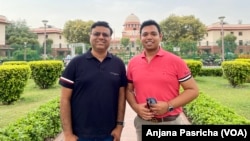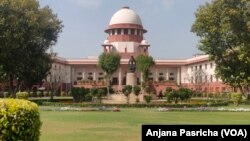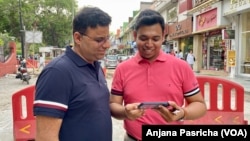India’s Supreme Court is hearing arguments in a landmark case on whether to legalize same sex marriage in the South Asian country, a right given by only about 34 countries so far.
The case follows a number of petitions filed by LGBTQ couples saying that the constitution prohibits discrimination on the basis of sexual orientation and gives all citizens the right to marry a person of their choice.
“What we are canvassing before this court is a new imagination of marriage and family whose foundation is love, care and respect," Vrinda Grover, one of the lawyers for the petitioners told the court.
India’s Hindu nationalist government and leaders from India’s main religions — Hindu, Muslim, Jain, Sikh and Christian, have strongly opposed same sex marriage.
The government has called same sex marriage a “mere urban elitist concept far removed from the social ethos of the country” and told the court that it will undermine social and religious values, while religious leaders have raised concerns of what same sex unions would mean for the “natural family order.”
Petitioners have however argued that the concept of marriage has changed over time. “Earlier we had child marriages, temporary marriages, a person could marry any number of times. That also changed,” lawyer Mukul Rohatgi said.
The hearings that began on April 18th before a five-judge bench led by Chief Justice D.Y. Chandrachud, are being livestreamed on YouTube and are getting widespread attention, both in the packed courtroom and outside.
Solicitor General, Tushar Mehta, who is appearing for the government, also questioned the court’s jurisdiction in deciding the matter, saying that only parliament and not judges could amend the law.
The judges dismissed his plea. But chief justice Chandrachud has said “the test really is how far can the courts go?” Activists have meanwhile pointed out that all the legal rights that the LGBTQ community has secured so far have come through the Supreme Court’s intervention.
The case holds huge significance for India’s LGBTQ community, which only emerged from the shadows four and a half years ago after the top court struck down a law criminalizing homosexuality.
Their legal battle for the right to marry marks the next big step in a country that is still largely conservative, but where acceptance and understanding of same sex relationships has been gradually growing. In the big cities, many now celebrate their sexuality openly.
The government estimates India’s gay population at about 2.5 million while gay rights campaigners say it is over 100 million.
Petitioners say both emotional compulsions and the practical need for legal rights that heterosexual couples take for granted prompted them to approach the court.
Among them are Abhay Dang and Supriyo Chakraborty, a gay couple based in the southern city of Hyderabad who held an elaborate “wedding” ceremony a year and a half ago to seal their partnership. But they still do not count as a married couple under the law.
“I really wanted to call Abhay my husband. My mother, my family accepted us. I want my mother to call Abhay loudly, proudly, legally as her son-in-law,” says Chakraborty as he emerged from the courtroom where the hearings were going on.
Another gay couple, Utkarsh Saxena and Ananya Kotia, who met 15 years ago in college, want the right to marry to be able to take their relationship forward. “In Indian society, marriage is an important institution, it is the bedrock on which a lot of social and family interactions occur, so emotionally this is an important next step for us,” says Saxena.
In practical terms, both couples say they want the host of legal rights that flow from being marriage such as adoption, filing joint taxes, holding joint bank accounts and inheritance rights.
The pivotal moment that prompted Dang and Chakraborty to approach the court was when they both contracted COVID-19 during the pandemic.
“It just made us realize that life is very, very fragile and we can’t really predict what may happen in the next moment,” said Dang. “We cannot sign documents for each other. Suppose I am hospitalized, and I need someone to make a decision for me, like a surgery or something of that sort, Supriyo would not be able to make that decision.” Both had contracted the virus during a deadly second wave that struck India in 2021.
Since they first met 10 years ago on a dating app, their journey has been like that of any heterosexual couple.
“As part of the relationship, we both have grown in terms of how to deal with things and just to value each other more than ourselves, our individual egos,” says Dang.
Gay rights activists dismiss the government’s argument that same sex marriage will undermine Indian society.
“We are looking at people who want to do something that society holds a lot of value for, the institution of marriage for example. And marriage denotes commitment, caring for each other, loving each other,” says Anjali Gopalan, Executive Director of the Naz Foundation. “They need a strong law to give them protection.”
The organization played a frontline role in a long legal battle to strike down the law criminalizing gay relationships.
While same sex marriages may still not be accepted by many in a society that is still traditional, petitioners have argued that societal acceptance will follow once law shows the way.
“There are social transformations happening and this is reflected in popular culture. For example, increasingly one sees very sensitive depictions of gay couples in movies and shows on streaming platforms. This shows us that people are ready for such a step,” according to Saxena.
Chakraborty found that in the last five years, discussions about homosexuality have come more easily, whether with families or friends.
“People don’t say the word gay not very quietly anymore. People are very confident to start a conversation about it. And I am not just talking about the LGBTQ community, I am talking about everybody in general.”
It is not clear when the court will pronounce a decision. But even as they wait for it, Saxena and Kotia hope the law will soon allow them to plan a marriage while Dang and Chakrabarty hope that ceremonies like the one they held will count as a legal wedding someday.












